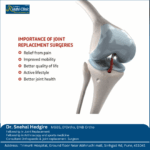
Orthopedic surgery can significantly improve your quality of life, whether you’re getting a joint replacement, addressing a sports injury, or managing a chronic condition. However, it’s essential to understand what to expect during the recovery process and how to prepare for a successful journey to healing.
1. Preparing for Surgery: Before your orthopedic surgery, you’ll have consultations with your surgeon. They’ll discuss the procedure, potential risks, and benefits. You might be advised to quit smoking, adjust medications, or improve your overall health. Follow their guidance closely to ensure a smoother recovery.
2. Post-Surgery Pain Management: Pain after orthopedic surgery is normal, but your medical team will work to keep it under control. You’ll likely be prescribed pain medication and given specific instructions on how and when to take it. It’s crucial to communicate with your healthcare provider about your pain levels and any concerns.
3. Physical Therapy: Rehabilitation is a crucial part of orthopedic recovery. You’ll work with a physical therapist who will guide you through exercises and movements designed to rebuild strength, flexibility, and mobility. The consistency of your physical therapy plays a significant role in your recovery.
4. Home Care: You may need assistance at home during the initial stages of recovery. Consider arranging for a friend or family member to help with daily tasks, transportation to appointments, and emotional support. Your living space should be modified to accommodate your mobility needs.
5. Monitoring for Complications: Pay close attention to your incision site for any signs of infection, such as redness, swelling, or drainage. Contact your surgeon immediately if you notice any concerning changes. It’s also essential to keep an eye on your overall health, including signs of blood clots or other complications.
6. Nutritional Support: A well-balanced diet is essential for healing. Proper nutrition supports tissue repair and overall recovery. Follow any dietary guidelines provided by your healthcare team, and consider consulting with a nutritionist if needed.
7. Emotional Well-Being: Recovery can be mentally challenging. You may experience frustration, impatience, or mood swings. Stay in touch with friends and family for emotional support. If you find yourself struggling with anxiety or depression, don’t hesitate to seek professional help.
8. Following Instructions: Your surgeon and medical team will provide specific post-surgery instructions. These may include restrictions on certain activities, wound care, and medication schedules. It’s vital to follow these instructions diligently to ensure a successful recovery.
9. Setting Realistic Expectations: Recovery times vary depending on the type of surgery and individual factors. Discuss your expectations with your healthcare team to gain a clear understanding of your recovery timeline.
10. Patience and Persistence: Remember that recovery is a journey, and progress may not always be linear. Celebrate small milestones, stay patient, and maintain a positive attitude throughout the process.
Recovering from orthopedic surgery may have its challenges, but with proper preparation, dedication, and support, you can look forward to a future with improved mobility and a better quality of life. Your healthcare team is your best resource for guidance and reassurance throughout the process.










